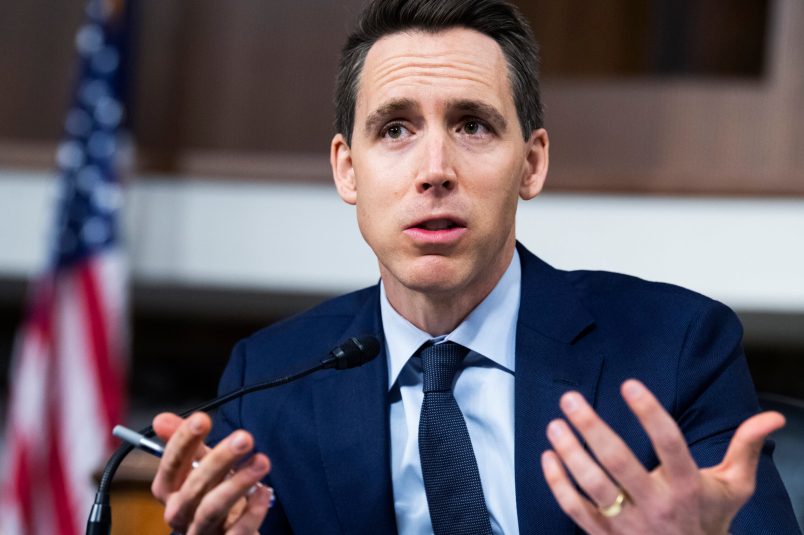This article is part of TPM Cafe, TPM’s home for opinion and news analysis.
The new year has begun and so, apparently, has the competition for the Republican nomination for president in 2024.
The opening salvo came in the last days of 2020 in the form of a Trump loyalty test over whether Joe Biden really won the election.
Last Wednesday, Senator Josh Hawley of Missouri announced that he would oppose congressional certification of the Electoral College results on Jan. 6, the final step in acknowledging Biden’s victory. Since then, 13 others have announced that they would vote to reject the electors from alleged “disputed states” unless there was an audit of the election returns, including Senators Ted Cruz of Texas, Ron Johnson of Wisconsin, James Lankford of Oklahoma, Steve Daines of Montana, John Kennedy of Louisiana, Marsha Blackburn of Tennessee, David Perdue and Kelly Loeffler of Georgia, and Mike Braun of Indiana, and Senators-elect Cynthia Lummis of Wyoming, Roger Marshall of Kansas, Bill Hagerty of Tennessee and Tommy Tuberville of Alabama.
These actions — which some have called an “attempted coup” designed to overturn a democratic election — will have no impact on the outcome of the election. It is intended to force senators to go on-record for or against Trump and for several of them to jump-start their presidential campaigns by appealing to Trump’s followers.
As a likely presidential wannabe, Hawley is staking out the “I’m Trump but without the incompetence and psychological derangement” flank within the party.
Senator Ben Sasse of Nebraska condemned Hawley’s ploy, calling it a “dangerous move” and labeling those who join in the effort to challenge Biden’s victory “institutional arsonists.” He warned that “adults don’t point a loaded gun at the heart of legitimate self-government.” Sasse is thus positioning himself as the “I’m a traditional right-wing Republican, but I sorta believe in democracy and I’m not an overt white supremacist” candidate.
Vice President Mike Pence, who has been Trump’s obsequious and sycophantic lapdog for four years, is trying to figure out how to walk that tightrope. Tomorrow (Wednesday, Jan. 6), he will be in the awkward position of officially declaring that Trump lost the election, a task required of all Vice Presidents. No matter how he handles that duty, he will alienate a significant portion of the Republican base.
Hawley, Sasse, and Pence — as well as other would-be presidential contenders like Cruz, Cotton, Senator Marco Rubio of Florida, former South Carolina governor and UN ambassador Nikki Haley, and current South Dakota Gov. Kristi Lynn Noem — will spend the next four years attacking or trying to obstruct Biden’s liberal proposals and calling him a socialist, while traveling around the country testing the waters in key primary states.
Although each of these figures will try to differentiate themselves from the others, what’s most striking about them is how much they have in common. They differ in height, weight, level of charisma, and personality, but there’s hardly any distance between them when it comes to what they believe about government and public policy. They all support l0w and regressive taxes, are hostile to social programs, oppose abortion, hate unions, and resist government regulations that protect workers, consumers, and the environment. Regardless of their personal views, their policy positions display an indifference to human suffering, particularly those whose lives have been hurt by poverty and/or racism. On a scale of one to ten — with ten being the most reactionary — I’d rate each of them an eight or above.
Despite Sasse’s attempt to distance himself from Hawley, they’ve both been Trumpites when it comes to their voting records. Sasse voted with Trump 86.2 percent of the time, according to FiveThirtyEight’s tracker, compared with Hawley’s 85.7 percent. But in the Trump loyalty Olympics, they fall behind Cotton (88.1 percent), Rubio (90.2 percent), and Cruz (91.9 percent).
When Noem served in the House, she displayed her fidelity to Trump on 92.2 percent of her votes. As governor, she’s clung close to Trump, visited Mar-a-Lago several times, and mimicked the president’s approach to the COVID-19 pandemic. She raised doubts about mask-wearing, encouraged large gatherings without social distancing, and is one of few governors who hasn’t issued a statewide stay-at-home order or mask mandate. When Haley served as UN ambassador, she did Trump’s bidding, echoing his inconsistent and dangerous views about America’s relationship with its allies and its enemies. Her most notable effort to distance herself from Trump’s craziness came in July 2018 when she said in a statement that “we don’t trust Putin, we never will.” By December of that year, she was out as UN ambassador.
None of these potential candidates quite share Trump’s personal style — an abrasive swagger and a bullying charisma — that evokes so much cult-like enthusiasm from his followers. The only high-profile Republican with similar traits is former New Jersey Gov. Chris Christie, but his previous presidential campaign was a dismal failure.
Several moderate Republican governors from blue states — Larry Hogan of Maryland, Charlie Baker of Massachusetts, and Phil Scott of Vermont — may be popular among anti-Trump Republicans like the pundits and operatives who organized the Lincoln Project, but they have no chance of winning a presidential primary in today’s Republican Party.
Of course Trump hasn’t ruled out running again. He’ll no doubt set up a campaign-like operation so he can continue to raise money and hold MAGA rallies, even though he looks likely to be busy dealing with his failing business empire and contesting myriad lawsuits from creditors, women alleging sexual harassment, and the New York attorney general and Manhattan district attorney, among others.
So long as Trump stays in the game — if only to make money and assuage his bruised ego — he won’t anoint an heir apparent. So every potential Republican presidential candidate will have to calculate how much to distance himself or herself from Trump and how to kiss his ass just enough to avoid becoming the target of his Twitter tantrums.
Besides Trump’s own behavior, three other big questions will shape the marathon race for the Republican nomination.
First, which candidates will gain favor among the rank-and-file conservatives among white evangelical Christians (who gave Trump 76 percent of their votes and accounted for 45 percent of his vote total) and the gun rights movement?
Second, how will the divisions within the business community and big-money GOP donors — from the Chamber of Commerce to the Mercer and Koch networks — play out in terms of supporting the different contenders?
Third, will the media treat the Republican contenders like the heartless extremists they are or will they cover it like a traditional four-year horserace story?
Don’t be surprised if the Republicans wind up with a 2024 ticket that embraces both the conservative and the reactionary wings of the party and is also diverse by race and gender to compete with Biden and VP Kamala Harris — Hawley/Haley or Haley/Hawley.
Peter Dreier is professor of Politics and the founding chair of the Urban & Environmental Policy Department at Occidental College. His books include Place Matters: Metropolitics for the 21st Century, The 100 Greatest Americans of the 20th Century: A Social Justice Hall of Fame, and the forthcoming Baseball Rebels: The Reformers and Radicals Who Shook Up the Game and Changed America.







Fortunately, they’re all in the same car…

What better way to build a winning coalition in 2024 than to tell the people you need that 2020 was a fraud?
He’s got plans alright
Sen. Josh Hawley (R-MI) has been called out for fabricating details of a protest outside his home in Virginia on Monday night. “Antifa scumbags came to our place in DC and threatened my wife and newborn daughter, who can’t travel,” he wrote. “Now ‘vigil’ means screaming threats through bullhorns, vandalizing property, pounding on the doors of homes and terrorizing innocent people and children.” However, the local police department said no property damage was reported and the group of about 15 protesters left without incident when police arrived. They were cited for writing chalk messages on the street, chanting in violation of local noise limits, and protesting outside a private home, which is illegal in Virginia. “It was a minor event,” a police spokesman said.
Hawley’s Furious Tweets About Antifa Attacking His Home Were BS, Cops Say
The Missouri senator claimed protesters vandalized his home on Monday night and terrorized innocent people.
The scariest part of that story is that he is breeding and reproducing…